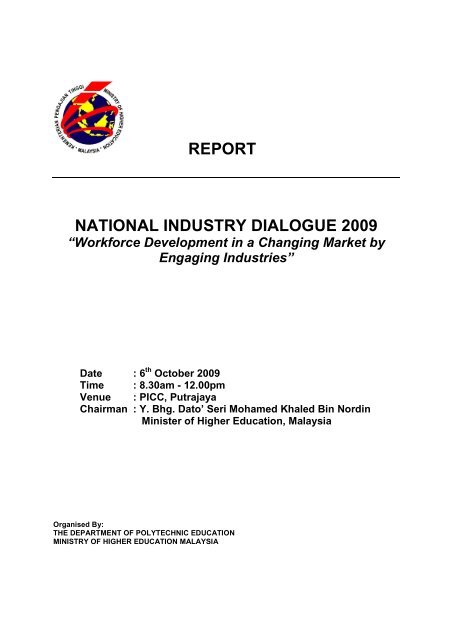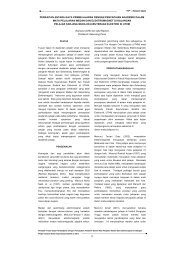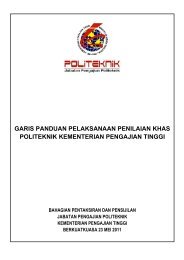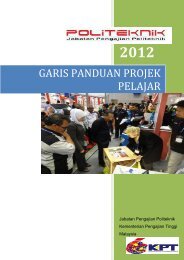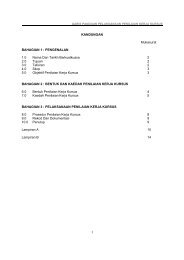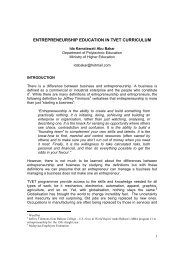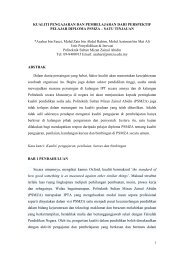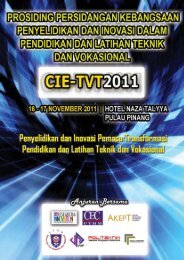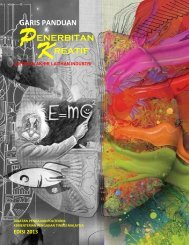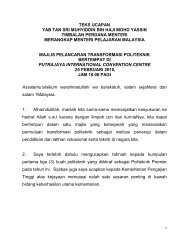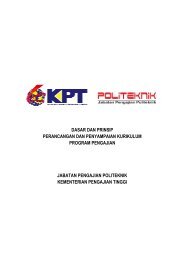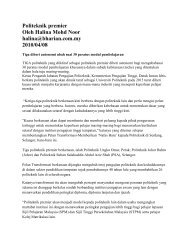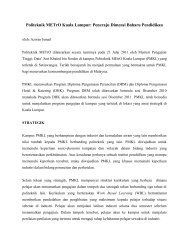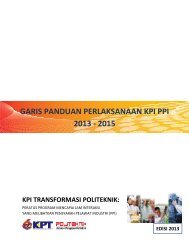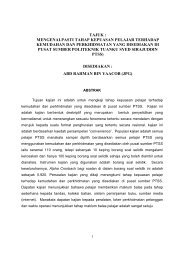national industry dialogue 2009 - Jabatan Pengajian Politeknik
national industry dialogue 2009 - Jabatan Pengajian Politeknik
national industry dialogue 2009 - Jabatan Pengajian Politeknik
You also want an ePaper? Increase the reach of your titles
YUMPU automatically turns print PDFs into web optimized ePapers that Google loves.
REPORT<br />
NATIONAL INDUSTRY DIALOGUE <strong>2009</strong><br />
“Workforce Development in a Changing Market by<br />
Engaging Industries”<br />
Date : 6 th October <strong>2009</strong><br />
Time : 8.30am - 12.00pm<br />
Venue : PICC, Putrajaya<br />
Chairman : Y. Bhg. Dato’ Seri Mohamed Khaled Bin Nordin<br />
Minister of Higher Education, Malaysia<br />
Organised By:<br />
THE DEPARTMENT OF POLYTECHNIC EDUCATION<br />
MINISTRY OF HIGHER EDUCATION MALAYSIA
CONTENTS PAGE<br />
EXECUTIVE SUMMARY i<br />
PREFACE 1<br />
PROCEEDINGS:<br />
Keynote Address : Workforce Development in a Changing Market by Engaging Industries 1<br />
Y. Bhg. Dato’ Seri Mohamed Khaled Bin Nordin<br />
Minister of Higher Education, Malaysia<br />
Presentation : Malaysia Employment Outlook – Changing Market Trends 2<br />
Mr Dhirendra Shantilal<br />
Senior Vice President (Asia Pacific)<br />
Kelly Services Inc<br />
: Status Report and Feedback on Issues Raised during the Industry 4<br />
Dialogue 2008<br />
Y. Bhg. Dato’ Hj Imran bin Idris<br />
Director General<br />
Department of Polytechnic Education<br />
QUESTION AND ANSWER SESSION 6<br />
SUMMARY 12<br />
CONCLUDING REMARKS 13<br />
APPENDIX:<br />
APPENDIX A – Survey Report<br />
APPENDIX B - Photos
EXECUTIVE SUMMARY<br />
The National Industry Dialogue <strong>2009</strong> in PICC, Putrajaya was the fourth <strong>dialogue</strong> organised by<br />
the Department of Polytechnic (DPE), Ministry of Higher Education. The theme for this year’s<br />
<strong>dialogue</strong> was ‘Workforce Development in a Changing Market by Engaging Industries’. The<br />
objectives were to promote and strengthen <strong>industry</strong>-education collaboration so as to develop a<br />
common understanding of the <strong>industry</strong>’s needs and how polytechnics and community colleges<br />
can fulfill those needs for the <strong>national</strong> as well as the inter<strong>national</strong> market.<br />
The Minister of Higher Education in his keynote address spoke on how engagement between<br />
the <strong>industry</strong> and higher education institutions can be improved in finding better ways to work<br />
together. With the current challenges posed by globalisation, the nation needs a highly<br />
sophisticated workforce capable of facing the challenges at home and in abroad. Programmes<br />
offered should be in line with the rapid changes in technology. The polytechnics are given<br />
specific roles in producing competent technical workforce must clearly define their role and<br />
relationship with the <strong>industry</strong>. This link will be mutually beneficial for both parties and would help<br />
train students who will be both academically and <strong>industry</strong> oriented. The Ministry is in the<br />
process of dividing the administration of the polytechnics and community colleges into two<br />
separate agencies in order to improve the efficiency and performance of the both sectors. This<br />
is part of the transformation of the Ministry and in order to ensure this change be successful, it is<br />
crucial the <strong>industry</strong> as one of the stakeholders to champion the cause.<br />
The next presentation entitled ‘Malaysia Employment Outlook – Changing Market Trends’ was<br />
delivered by the Senior Vice President (Asia Pacific) for Kelly Services Incorporated. An<br />
interesting outline on the skills needed to remain current in the evolving Malaysian workplace,<br />
employment trends in Malaysia’s multi-sector economy and how skills and productivity can be<br />
raised in a globalised environment were given.<br />
The Director General of DPE in his presentation gave a brief review on the Technical Vocational<br />
Education and Training (TVET) System in Malaysia. It was then followed by the status report of<br />
the issues raised during the previous Industry Dialogue held in October 2008 and the Kuching<br />
Industry Dialogue Luncheon held in August <strong>2009</strong>. A brief account on the DPE’s Collaboration<br />
Model and the establishment of Industry Advisory Committee were also given. Industry<br />
collaborations are emphasised in all DPE’s activities in order to remain relevant.<br />
i
In the Question and Answer session, issues were raised on younger generations’ attitude<br />
towards the work life, retaining workforce, lack of soft skills among graduates, work based<br />
learning (WBL), lack of workforce in certain <strong>industry</strong> sectors, Malaysia Qualification Agency<br />
accreditation of programmes, and bridging the gap between the academic world and <strong>industry</strong>.<br />
From the issues raised, three pertinent points were identified as follows:<br />
- Soft skills, entrepreneurship development and training in the institutions;<br />
- Bridging the gap between school and work; and<br />
- MQA accreditation of programmes.<br />
ii
PREFACE<br />
The National Industry Dialogue <strong>2009</strong> in Putrajaya Inter<strong>national</strong> Convention Centre (PICC),<br />
Putrajaya was the fourth <strong>dialogue</strong> organised by the Department of Polytechnic Education (DPE),<br />
Ministry of Higher Education. The theme for this year’s <strong>dialogue</strong> was ‘Workforce Development<br />
in a Changing Market by Engaging Industries’. The objectives were to promote and<br />
strengthen <strong>industry</strong>-education collaboration so as to develop a common understanding of the<br />
<strong>industry</strong>’s needs and how polytechnics and community colleges can fulfill those needs for the<br />
<strong>national</strong> as well as the inter<strong>national</strong> market.<br />
The <strong>dialogue</strong> was attended by 207 participants with 83 representatives from 56 agencies,<br />
associations and public listed companies from the <strong>industry</strong> together with senior officers from the<br />
Ministry of Higher Education, polytechnics and community colleges.<br />
PROCEEDINGS<br />
KEYNOTE ADDRESS : Workforce Development in a Changing Market by Engaging Industries<br />
Presenter : Y. Bhg. Dato’ Seri Mohamed Khaled Bin Nordin<br />
Minister of Higher Education, Malaysia<br />
The National Dialogue <strong>2009</strong> is seen as a beneficial platform to better understand the needs of<br />
the <strong>industry</strong> within the context of <strong>national</strong> development. The input collected was acted on and<br />
continuous feedback and support from the <strong>industry</strong> in forums and <strong>dialogue</strong>s are highly<br />
encouraged. The engagement between the <strong>industry</strong> and higher education can be improved<br />
through finding better ways of working together which demands great commitment from both<br />
parties.<br />
In order to thrive in today’s dynamic global economy, we need a highly sophisticated and<br />
adaptable workforce, capable of facing challenges at home and abroad. Different higher<br />
education institutions have different functions and roles to play. These education institutions<br />
produce students of different skills. Polytechnics are given the specific role as the premier<br />
provider of technical and professional education, producing a technical competent work force for<br />
1
the nation. The polytechnics must clearly define their role and relationship with the <strong>industry</strong>. The<br />
roles played by polytechnics as knowledge developers in providing human resource for the<br />
<strong>industry</strong> and the <strong>industry</strong> as human capital users and knowledge consumers providing the<br />
professional and practical conditioning should be symbiotic. It is in the best interest of these two<br />
entities to forge a strong relationship of mutual benefit to each other.<br />
Recently, the polytechnic and community college have been separated into 2 different agencies<br />
to improve the efficiency and performance of both sectors. In order to ensure this transformation<br />
of the polytechnics is relevant in an era of innovation led change within the <strong>industry</strong>, it is crucial<br />
the <strong>industry</strong> as stakeholders understand and champion the cause.<br />
Presentation : Malaysian Employment Outlook-Changing Market Trends<br />
Presenter : Mr. Dhirendra Shantilal<br />
Senior Vice President (Asia Pacific), Kelly Services Inc.<br />
Malaysia has celebrated 50 years of independence and is one of fast growing nation in the Asia<br />
Pacific region with 11.2 million workforces. In line with the development, Malaysia needs to<br />
produce more students who are competitive with technical and behavioural competency in<br />
workplace, able to communicate, articulate and present ideas, able to think out of box and who<br />
are creative. This would be a challenge for higher education institutions to incorporate these<br />
skills. Therefore the academia must be forward looking and work well with the <strong>industry</strong> to<br />
produce this excellent workforce.<br />
Significant investment in education helps to develop human capital. There are now about 25<br />
private universities and 20 university colleges in Malaysia. Within a short span of time, from<br />
2005 to 2008, student enrolment in public and private higher education institutions has<br />
increased by over 33% and 54% respectively.<br />
The challenge for graduates is to ensure that their skills remain current and relevant.<br />
Continuous skills education is essential in today’s world. In developing skills required in the new<br />
knowledge-based economy, there is a part to be played by students, higher education,<br />
employers and policymakers.<br />
2
The employment trends in Malaysia recognises the emergent hiring trends in the fields of<br />
manufacturing (computer and peripherals, plastics in primary forms and semi-conductor<br />
devices), healthcare, education, IT (outsourcing and shared services), telecommunications<br />
(cellular and shared services), engineering (oil & gas, waste water management etc), green<br />
technology, call centre, services (tourism and Islamic banking & finance), market research,<br />
marketing, business development and accounting.<br />
To meet the demand of the rapid growth of the nation, the academia and the <strong>industry</strong> must<br />
prepare themselves for this new workforce.<br />
Malaysia’s education system should continue to equip students with relevant skills sets and<br />
training to prepare them for the global competitive landscape. This can be done by partnering<br />
with <strong>industry</strong> leaders to offer job attachments, internships and career counselling to prepare<br />
students for the work world. This <strong>dialogue</strong> can be a form of platform and this collaboration<br />
should continue in years to come.<br />
In addition, continued development of English in the Malaysian education domain is vital to<br />
enable graduates to succeed in the global workplace. Effective and systematic training<br />
strategies should be adequately planned, provided and evaluated to ensure that English<br />
instruction adapts comfortably with the changing environment. Bahasa Melayu as the <strong>national</strong><br />
language together with English are equally important. English being the business language will<br />
further allow students to compete globally.<br />
The shift to knowledge-based jobs requires training, upgrading and talent development.<br />
Opportunities for partnerships between higher education institutions, businesses in the private<br />
sector and the government are important. In a nutshell, this kind of collaboration would form an<br />
excellent and competent workforce.<br />
3
Presentation : Status Report and Feedback on Issues Raised during Industry Dialogue<br />
2008<br />
Presenter : Y. Bhg. Dato’ Hj Imran bin Idris<br />
Director General, DPE<br />
The Department of Polytechnic Education (DPE), Ministry of Higher Education Malaysia<br />
(MoHE), offers Technical Vocational Education and Training (TVET) at the middle professional<br />
and management levels for programmes in the fields of engineering, business and services.<br />
The focus of TVET in the polytechnics and community colleges is post secondary education at<br />
the certificate and diploma levels, to train technicians and skilled personnel. Full time<br />
programmes at the diploma and certificate levels mainly caters for post secondary school<br />
leavers. Polytechnic education gives emphasis on practical content and 6 months industrial<br />
training is built into the curriculum.<br />
DPE currently manages 27 polytechnics offering 49 diploma programs, 22 certificate programs,<br />
12 foundation programs, five special skills programs and one advanced diploma program with<br />
the total enrolment nearing 100,000 students. DPE also offers 21 part time programs and 89<br />
customised programmes for the <strong>industry</strong>. The total number of staff in the polytechnics is 8,177.<br />
The Industry Dialogue 2008 which was held in Putrajaya attracted 328 participants. There were<br />
several issues raised. The first issue raised was the rating of polytechnic programmes. An<br />
instrument known as the Star Rating Model developed by MAMPU will be implemented in 2010.<br />
Premier Polytechnic(s) will also be identified by 2010 and Centres of Excellence/Technology<br />
and Niche areas are being established.<br />
The second issue raised was intensifying lecturers’ attachment with <strong>industry</strong>. Since the<br />
lecturers’ attachment programme was started, a total of 449 lecturers have been attached with<br />
381 companies. In <strong>2009</strong> alone, 61 lecturers underwent attachment in 59 companies.<br />
The third issue pertains to intensifying guest lecturers from the <strong>industry</strong>. In the year 2008, 523<br />
guest lecturers were invited whereas the number increased to 605 for the year <strong>2009</strong>.<br />
The fourth and last issue raised during the Industry Dialogue 2008 was joint certification<br />
programmes. Existing programmes include CCENT,CCNSA, CompTIAA+, Database, Cisco<br />
Academy, Design SQL and MCDST. This year an Memorandum of Understanding has been<br />
4
signed with Siemens (M) Sdn. Bhd. for the Siemens Certification in Mechatronics. To date, 10<br />
lecturers have completed training in Berlin and another 10 are currently undergoing training.<br />
Other on-going programmes include CAD-CAM, CNC, Welding, Automotive and Hospitality.<br />
An Industry Dialogue Luncheon was held in Kuching, Sarawak in August this year. Several<br />
issues were also raised. They were entrepreneurship in institutions, work-based learning to be<br />
extended to Sarawak, the possibility of training of foreign manpower and the acceptance of<br />
graduates by industries. All these issues are taken very seriously and DPE is working on them.<br />
The DPE Collaboration Model involves <strong>industry</strong> input, the collaboration of <strong>industry</strong>-institution<br />
and institution output. The <strong>industry</strong> feedbacks are from DPE’s <strong>industry</strong> advisory committee,<br />
<strong>dialogue</strong>s, seminars and networking sessions. The collaboration of the <strong>industry</strong> and institutions<br />
are in the form of student industrial training, staff industrial attachment, <strong>industry</strong> lecturers and<br />
other collaboration efforts such as Time Sector Privatisation, career/technical talks, curricula<br />
development, work based learning programmes and joint projects/research. Meanwhile,<br />
institution output is to promote employability, salary enhancement and provide manpower for<br />
economy competitiveness.<br />
Some of the activities conducted since the <strong>dialogue</strong> last year till September <strong>2009</strong> includes the<br />
Life Long Learning Seminars and Logistics Seminars. DPE has also signed MoUs with 3<br />
parties, namely, a shipbuilding company – NGVTech Sdn Bhd, Malaysian Association of Hotels<br />
Kedah/Perlis Chapter and Siemens Malaysia Sdn Bhd.<br />
Majority of polytechnic graduates enter the workforce after graduation. By offering a wide range<br />
of programmes and courses that lead directly to employment opportunities and articulation<br />
pathway for progression to the university, TVET will no longer be viewed as a terminal<br />
qualification but part of the framework that aims to promote and provide pathways, progressions<br />
and complementarities between the different types of education and training.<br />
The participants of the National Industry Dialogue <strong>2009</strong> are invited to strive together for<br />
continuous improvement. Their support towards developing employable and entrepreneurial<br />
graduates in the changing market is deeply appreciated.<br />
5
QUESTION & ANSWER SESSION<br />
Panelists : YB. Dato’ Saifuddin Abdullah, Timbalan Menteri <strong>Pengajian</strong> Tinggi (Chairman)<br />
Y.Bhg. Dato’ Haji Imran, Ketua Pengarah JPPKK<br />
Tn Hj Shamsuddin Bardan, Pengarah Eksekutif MEF<br />
Mr Dhirendra Shantilal, Senior Vice President (Asia Pacific)<br />
Question 1: Ms. Diana Lee Geok Chin - Motordata Research Consortium Sdn Bhd<br />
Suggestion: Break up sessions should be introduced in the later part of the <strong>dialogue</strong> session<br />
so as the various sectors of the <strong>industry</strong> will be given the opportunity to present their needs.<br />
MoHE and the polytechnics will then be able to have the necessary feedback to respond to<br />
these needs. This will be a more effective approach as the discussion and sharing of<br />
information will be more focused.<br />
Response: Chairman<br />
This suggestion is very useful and will be considered for the next <strong>dialogue</strong>.<br />
Question 2: Y.Bhg. Dato' Esa Mohamed – Akitek Jururancang (M) Sdn Bhd<br />
The construction sector which contributes 5% GDP is in dire need of sub professionals such as<br />
clerk of works and site supervisors. There are at present only four polytechnics that offer the<br />
diploma programme in architecture. Even though the Institute of Architects and the Construction<br />
Industry Development Board do have training programmes for the construction sector, they are<br />
still in sufficient. It is quite crucial for the construction sector to have more manpower. It is<br />
suggested that polytechnics provide training for clerk of works and supervisors.<br />
Question 3: Mr Abdul Razak Dawood – Proton Edar Sdn Bhd<br />
Suggestion : The name list of students and graduates of the polytechnics can be published on<br />
the MoHE’s website so that organisations can access for direct outreach.<br />
Response: Chairman<br />
This is a good suggestion.<br />
6
Question 4 : Mr. Teh Kean Ming – IJM Corporation Berhad<br />
The Generation X and Y workforce today has different expectations of working life and all<br />
organisations face the challenge of trying to instil into them interest and passion in the<br />
workplace. A lot of employees are job hopping. Polytechnics should not only teach technical<br />
content but also soft skills and “human side” qualities.<br />
Response: Chairman<br />
We are indeed faced with this new kind of graduates who have a different mindset. Loyalty to<br />
life long service is no longer relevant and we must take this into account.<br />
Response: Y. Bhg. Dato’ Haji Imran<br />
Before embarking on the 6 months industrial training students have to undergo a soft skills<br />
module to enhance their readiness at their future workplace. In addition to the soft skills module,<br />
they are also exposed to various co-curriculum activities which teach discipline and teamwork,<br />
such as the mandatory Polibriged programme. There definitely is much more to be enhanced<br />
and done.<br />
Response: Y. Bhg. Dato’ Prof. Ir. Dr. Radin Umar Radin Sohadi, Director General, Higher<br />
Education Department, MoHE<br />
The Higher Education Department has developed an instrument to measure the presence of<br />
generic soft skills attributes such as communication skills, problem solving skills, passion, ethics<br />
etc in students at the point of exit. These attributes will enable the universities to look at the<br />
teaching and learning taxonomies and the integration from the input will be outcome based. This<br />
is part of the quality assurance in ensuring and enhancing graduate employability. The<br />
department has been in discussion with DPE and certain skill sets for polytechnic students will<br />
need to be finetuned.<br />
Response: Tn Hj Shamsuddin Bardan<br />
Job hopping always happen and the overall attrition rate in Malaysia at present is 2% with<br />
electrical and construction sector at up to 8%. There are actually means and ways to prevent<br />
job hopping. For example, the company should make clear to their employees the career paths<br />
in the companies. Pro-active remuneration packages in terms of innovative incentives which are<br />
performance based, non contractual remunerations given at any time or on a quarterly basis<br />
7
may be an alternative method. Other methods may be share option scheme and co-owned<br />
retirement fund.<br />
Question 5 : Mr. Teh Kean Ming – IJM Corporation Berhad<br />
Further to Question 4, There seem to be the need for a mentoring system (one to one) to be in<br />
place. The generation of workforce need to take a long term view.<br />
Response: Mr. Dhirendra:<br />
40% of the present workforce is from generation Y. Companies have to adapt to work and deal<br />
with this new generation. This new generation is found to struggle when working in teams in the<br />
actual workplace but do not have problems in a virtual environment. By showing a longer term<br />
picture of prospects in the company, career paths and expectations made clear right from the<br />
beginning, continuous professional development provided and not only promotion may be able<br />
to bring about the passion, excitement for the job.<br />
Question 6 : Mr. Ainual Azhar Bin Hj Jasmi – AJ Food Industries (M) Sdn Bhd<br />
We are collaborating with the Community College in the work based learning programme for the<br />
Diploma in Food Technology. We had a very good experience with the pioneer batch. However,<br />
no students were sent to our company as the second batch and we had made plans and<br />
preparations to receive the students. Why and what had happened?<br />
Response: Y. Bhg. Dato’ Haji Imran requested Mr Tajuddin Abdul Rashid, Examination<br />
and Evaluation Division Director of the Community College Management Sector to give<br />
an explanation.<br />
Response: Mr Tajuddin Abdul Rashid<br />
This particular programme is conducted at the Kolej Komuniti Sabak Bernam. There was very<br />
good response for the first batch. However, the sector had difficulties in getting enough students<br />
enrolled for the diploma course as the students after graduating from their certificate programme<br />
started work and are reluctant to continue their studies. Therefore, only 13 students enrolled for<br />
the second batch and this is the reason no students were place with AJ Food Industries.<br />
8
Response: Y. Bhg. Dato’ Haji Imran<br />
It is a growing trend that students are reluctant to leave their jobs once they start working as<br />
they are afraid it might be difficult to find another job should they continue to further their<br />
studies. The present economic crisis may be another contributing factor.<br />
Question 7 : Mr Mohamd Fauzi Hassan (Magnificient Diagraph Sdn Bhd - Carrefour M’sia)<br />
How do we build resilience in our graduates especially in the retail <strong>industry</strong>? They experience a<br />
culture shock as facing customers puts them under pressure. Expectations of the company are<br />
very high in terms customers satisfaction and it becomes a deterrent for them to remain in the<br />
jobs. It may be good to catch them young by incorporating certain elements in the curriculum<br />
while they are studying in building up their resilience.<br />
Response: Chairman<br />
The comments are noted. MoHE is trying very hard to tackle this issue.<br />
Response: Tuan Haji Shamsuddin<br />
We should be more innovative in running our programmes. For example, in developed<br />
countries, the hotel and catering programmes, an actual hotel is used as the training ground<br />
instead of using classrooms. This will reduce the culture shock in the transition from school to<br />
work. This concept can be replicated for other industries. Investment may be high but as<br />
charges will have to be less than the norm but should still be self-sustaining. Quality assurance<br />
of course must be maintained and business professionally carried out.<br />
Response: Chairman<br />
Real work laboratories are worthwhile to look into especially best practices and new teaching<br />
technologies in developed countries.<br />
Question 8 : Mr Mahathir Mansor – Faber Group Berhad<br />
Faber is a partner in the workplace based learning programme and find the programme have<br />
many benefits as the students are in the actual working environment, have confidence after the<br />
programme and are <strong>industry</strong> ready. Faber would like to suggest that the students should<br />
undergo their one year stint in the <strong>industry</strong> right at the end of the programme so as to enable the<br />
<strong>industry</strong> to directly absorb these students upon graduation.<br />
9
Response: Y. Bhg. Dato’ Haji Imran<br />
The department is looking into this matter.<br />
Question 9 : Y. Bhg. Dato’ Meer Sadik Habib–Malaysian Retailers Association<br />
Not many people understand the retailing <strong>industry</strong> and there are always problems in getting and<br />
retaining staff as there is very little exposure to opportunities in this service <strong>industry</strong> especially<br />
the mindset of working long hours and during holidays. There are great demand for staff in<br />
supervisory roles, inventory and financial analysis. Gemmology is another area of great<br />
potential. MoHE especially the community colleges should focus on these areas and work on<br />
the mindsets of the students so that they really understand the importance of customers and will<br />
be work ready. Staff pinching is another problem faced by the <strong>industry</strong> as the companies cannot<br />
afford to pay initial high salaries.<br />
Response: Ms Diana Lee Geok Chin- Motordata Research Consortium Sdn Bhd<br />
The automotive repair <strong>industry</strong> also experiences of staff pinching and had to bring in foreign<br />
workers. The Ministry of Human Resources run an apprenticeship programme whereby 70% of<br />
the apprentice time is spend in the workshop with pay and another 30% of the time in the<br />
institution. This gives potential employers the opportunity to gauge the performance of potential<br />
employees.<br />
Response: Chairman<br />
The Department of Polytechnic Education should look into this area by referring to the work<br />
based learning model.<br />
Response: Y. Bhg. Dato’ Haji Imran<br />
The Department of Polytechnic Education looks forward to discussing further with the Motordata<br />
Research Consortium Sdn Bhd on this matter. The department has embarked on similar<br />
programmes in medical electronics.<br />
Question 10 : Abdul Razak – Proton<br />
Proton has been participating in the work based learning programmes for three years. However<br />
Proton is losing these trained technicians as their diplomas is yet to be certified by the Malaysia<br />
Qualification Agency (MQA). Without this recognition, Proton is unable to pay these technicians<br />
10
the salaries that commensurate with their qualifications and therefore these technicians go<br />
elsewhere.<br />
Response: Y. Bhg. Dato’ Haji Imran<br />
We are in the process of getting the MQA certification.<br />
Question 11: Mr Rohizan Zainal - KBU Singgahsana (PJ) Sdn Bhd<br />
The problem of striking a balance and bridging between the academic world and the <strong>industry</strong><br />
exists. It would be beneficial to all parties if they can sit down for a serious discussion whereby<br />
the real issues can be brought up and to ensure there is real participation from the <strong>industry</strong> in<br />
the academic world especially for outcome based education in curriculum development and the<br />
building of generic skills in the curriculum. MoHE should be the catalyst to get all this together<br />
and a taskforce could be formed for the above purpose. More is expected from the polytechnics<br />
and community colleges as they should focus on niche markets and psychomotor skills.<br />
Assessment should be on skills training and not academically inclined, otherwise there will be<br />
no difference between the polytechnics, community colleges and universities. Industry people<br />
should also be involved in MQA as it is observed that the panellists in MQA are mainly<br />
academicians. This lack of <strong>industry</strong> participation may become a stumbling block and this setup<br />
should be revamped. Otherwise, the problems associated with the lack of work ready workers,<br />
salaries etc will persist.<br />
Response: Chairman<br />
Dato’ Imran and his team would look into your comments and suggestions.<br />
Response: Mr Mahathir Mansor – Faber Group Berhad<br />
The work based learning programme’s curriculum used in our company with Ministry is planned<br />
and developed based on our needs and is therefore <strong>industry</strong> driven and suited for the <strong>industry</strong>.<br />
We are even planning to send our students to Abu Dhabi.<br />
Response: Chairman<br />
Different institutions have different views. There need to be effective collaboration between all<br />
parties.<br />
11
Response: Mr Andrew Ong - Master Builders Association Malaysia<br />
The Department of Polytechnic Education should train more hands-on technicians and<br />
executives as many local companies are going overseas to carry out projects especially in the<br />
middle east where the situation needs experienced and hands-on technical staff to lead the<br />
workers there who are not really trained or are only semi-trained.<br />
SUMMARY<br />
Comment : Mr. Dhirendra Shantilal<br />
Better collaboration between the academia and <strong>industry</strong> is needed. Learning is a life long<br />
process and the <strong>industry</strong> should invest in their people with continuous training. Polytechnics<br />
should come up with programmes that are <strong>industry</strong> driven and longer attachment for students’<br />
industrial training. The challenges facing with younger workforce is global. Younger workforce<br />
does not like to be monitored or told what to do. Companies should emphasis more on a project<br />
based or outcome based approach in dealing with younger workforce and not so much micro-<br />
managing. Soft skills should be embedded not only in polytechnics but should be done even in<br />
schools.<br />
Comment : Tn Hj Shamsuddin Bardan<br />
New technologies such as green technology and renewable energy are fast growing areas and<br />
there is a need to move towards that. There are still a large number of qualifications that are not<br />
recognised <strong>national</strong>ly. We need to synchronise our act so that are efforts are co-ordinated with a<br />
sense of urgency in order to fill the future needs of our country.<br />
Comment: Y. Bhg. Dato’ Hj Imran bin Idris<br />
Polytechnic education emphasises on work-related, hands-on programmes. The curriculum<br />
consists of 60% practical content and 40% of academic content. The department will take note<br />
of the need to improve soft skills in students, initiate more programmes towards the service<br />
<strong>industry</strong> and work on MQA accreditations.<br />
Comment: Chairman<br />
12
Looking into the polytechnics after 40 years, three or four polytechnics will be chosen as prime<br />
polytechnics offering programmes at master skills level or even degree like programmes. This<br />
will provide an avenue of ex polytechnic graduates who would like to further their training but<br />
cannot follow the normal articulation pathway as the normal universities are very academic in<br />
nature. This is part of the transformation MoHE has embarked on the role and functions of the<br />
polytechnics.<br />
CONCLUDING REMARKS<br />
YB Dato’ Saifuddin Abdullah, Deputy Minister of Higher Education.<br />
The Chairman thanked all participants for their support and interest in the <strong>dialogue</strong>. The<br />
<strong>dialogue</strong> had been invaluable in helping build stronger ties between the <strong>industry</strong> and DPE.<br />
Thus, the following issues raised will be taken note:<br />
- Soft skills, entrepreneurship development and training;<br />
- Bridging the gap between school and work; and<br />
- MQA accreditation of programmes.<br />
13


